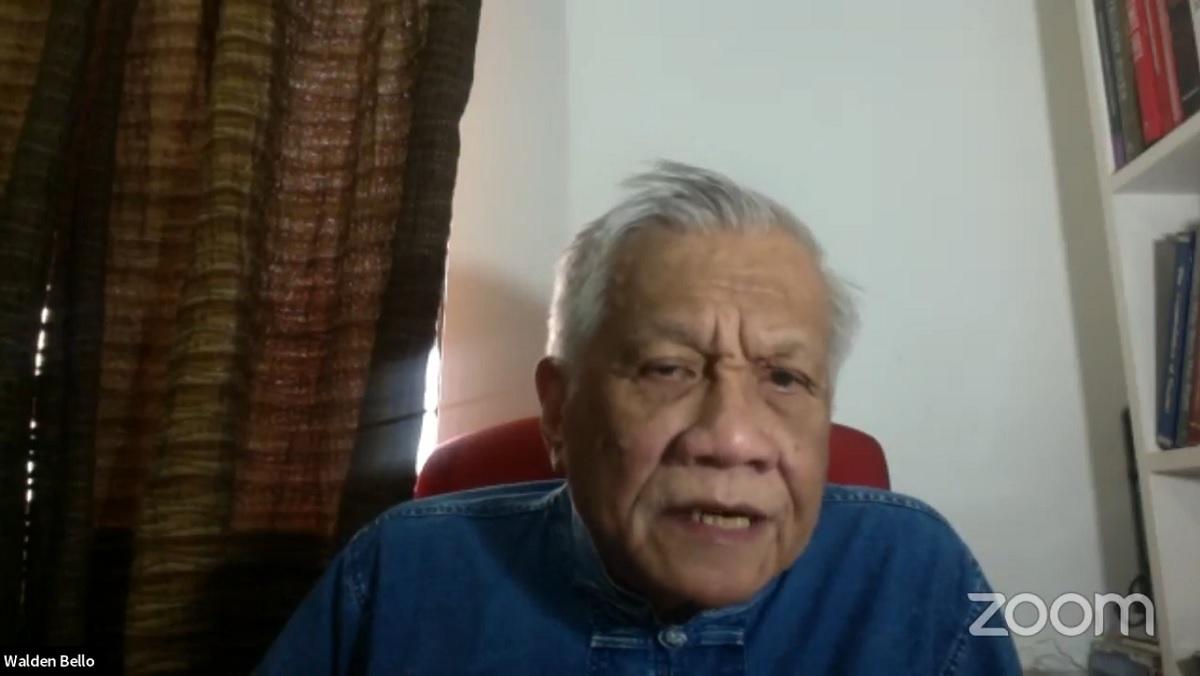Walden Bello: Duterte admin passed the most pro-foreign investor measures

Vice presidential aspirant Professor Walden Bello on Wednesday called out the recent economic bills of President Rodrigo Duterte’s administration, saying they were mostly in favor of big businesses and foreign investors.
At the Freedom From Debt Coalition's virtual forum, Bello said that Duterte and Finance Secretary Carlos Dominguez III "accelerated" neoliberal economic policies in the country.
“The Duterte administration has the distinction of having passed the most neoliberal, pro-big business, and pro-foreign investor measures since the presidency of Fidel Ramos back in the middle-late 90s,” he said.
He claimed that Duterte and Dominguez have become the “darlings of big business and foreign capital owing to their successfully pushing through Congress measures long coveted by these powerful economic actors.”
Bello said that the most crucial bill under the Duterte administration was the proposed measure modernizing the Public Service Act, which he said, is “notorious for being unconstitutional.”
On February 2, the Senate and the House of Representatives adopted the bicameral report for Senate Bill 2094 and House Bill 78, which aims to amend the 85-year-old Public Service Act.
The measure seeks to clear ambiguity surrounding the terms “public utility” and “public service,” identifying public utilities as the following: the distribution and transmission of electricity; petroleum and petroleum products pipeline transmission systems; water pipeline distribution systems and wastewater pipeline systems, including sewerage pipeline systems; seaports; and public utility vehicles.
According to the proposed law, any industry not included among these will remain public services and will be liberalized.
“The elimination of the nationalist provisions of the constitution had long been demanded by the foreign investors’ lobby. The COVID-19 pandemic provided a perfect opportunity for them to push their goal in the form of the Amended Public Services Law, justifying it as necessary to create foreign-owned enterprises that would ‘assist’ the country to ‘recover’ from COVID-19,” Bello added.
He also highlighted the Corporate Recovery and Tax Incentives for Enterprises (CREATE), signed into law in March 2021, which will reduce corporate income tax from 30% to 25% for corporations, and 20% for micro, small and medium enterprises.
“Since excise taxes fall mainly on the poor and the middle class, the total effect of the conjunction of the imposition of excise taxes and the slashing of the corporate income tax is to take burden of taxation away from the rich and foreign corporations and place it on the middle class and the poor,” he said.
Bello also questioned the amendments to the Retail Trade Liberalization Act and the Foreign Investment Act which he believes the foreign investment lobby “rammed through” using the pandemic as an excuse.
Adding to these were the lifting of the moratorium on new mineral agreements in April 2021 and the lifting of the ban on open-pit mining in December 2021, which he said were the Duterte administration’s “two gifts” to the mining industry.
Bello then recalled Duterte’s statement that he would put an end to mining, noting that he achieved the opposite due to Dominguez.
“His administration will go down not only as having killed thousands of Filipinos with its bloody war on drugs but as also having successfully crafted into law or decreed the most the pro-foreign investor and big business policies since the Ramos administration 30 years ago,” Bello said.
GMA News Online has reached out to Dominguez for comment.
Rice Tariffication Act
Further, Bello stressed that the current administration’s “most damaging concession to foreign interests” was the Rice Tariffication Act (RTA) which was signed by Duterte in February 2019, removing the quantitative restrictions on rice importation and imposed a 35% tariff on imports from Southeast Asian countries.
The Bureau of Customs collected a total of P18.9 billion in duties from rice imports last year, up 22% from P15.5 billion in 2020.
Duties collected from rice imports, beginning March 5, 2019, go to the annual P10-billion Rice Competitiveness Enhancement Fund (RCEF) pursuant to the law.
Bello then slammed fellow vice presidential candidate Senator Francis Pangilinan for abstaining during voting for the RTA but approving the Republic Act 11598 or the law providing cash assistance to farmers tilling small scale of rice land until 2024.
The said cash assistance will be sourced from the RCEF provided under the Rice Tariffication Law.
“Incidentally, Senator Kiko Pangilinan abstained during the RTA vote, but he voted for the amendment to it, RA 11598, that provided funds for its implementation,” he said.
“He's an intelligent guy, but this is the problem, even the people that say they are pro-farmers have in fact, participated in stabbing our farmers in the back,” he added.
GMA News Online has also sought comment from Pangilinan.
During the Partido ng Lakas ng Masa proclamation rally, Bello said that the "ultra-rich" would be hurt by his and running mate Leody De Guzman’s proposed structural reforms, including wealth tax and comprehensive agrarian reform. — BM, GMA News



